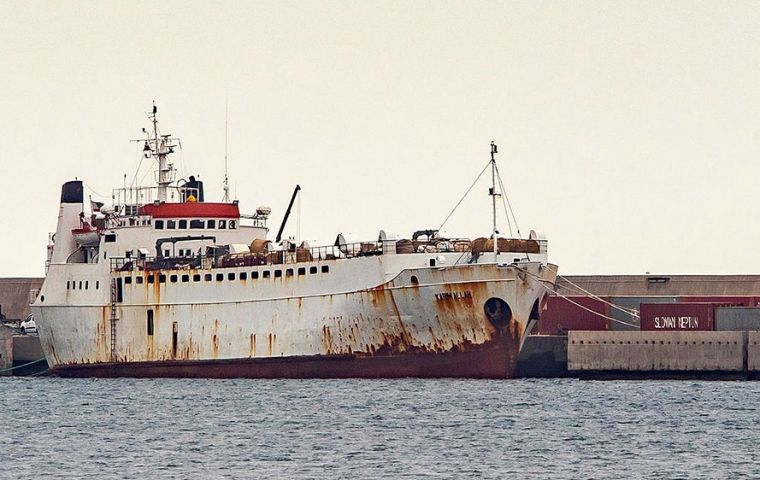MercoPress. South Atlantic News Agency
Caged cattle in a rogue vessel stranded in the Mediterranean will be sacrificed
 The Lebanon-registered ship had left the Spanish port of Cartagena in December and was headed to Turkey to sell the young bulls, according to the daily El Diario.
The Lebanon-registered ship had left the Spanish port of Cartagena in December and was headed to Turkey to sell the young bulls, according to the daily El Diario. Some 864 head of cattle aboard the ship “Karim Allah” are to be sacrificed, Spanish authorities confirmed on Saturday, following days of controversy over the animals' health.
The ship owners “should proceed to isolate and slaughter the animals in accordance with the applicable regulations,” the Agriculture Ministry was quoted as saying.
The Lebanon-registered ship had left the Spanish port of Cartagena in December and was headed to Turkey to sell the young bulls, according to the daily El Diario.
However, Turkish authorities refused to accept the vessel for fear of the so-called bluetongue disease. The ailment causes lameness and hemorrhaging among cattle, although it has no effect on humans.
Turkey also suspended live animal imports from Spain.
“Karim Allah” then tried to find a new buyer in Libya, but was rejected from docking in Tripoli. Several other countries then also denied the ship port, leaving the crew struggling to feed the animals.
“We tried to get more feed in Tunisia...but they kicked us out,” said lawyer Miguel Masramon, who represents ship owner Talia Shipping Line. “In the end, we managed to get more in Sicily after the animals spent several days with only water,” he told Marine Link news outlet.
Eventually, the ship turned back to Cartagena. The Spanish authorities also prohibited it from docking before reversing their decision and allowing government veterinarians to inspect the animals earlier this week.
Animal rights activists say the aging ship was not designed to house cattle. While the report makes no mention of the bluetongue disease, it indicates that the cattle have suffered from the prolonged journey, with 85% appearing to have fungal infections and “a large number” affected by digestive disorders. The animals would also not be sold to a third country, according to the officials, indicating that it was best for all of them to be sacrificed.
Masramon criticized the officials, saying they failed to collect blood samples and focused more on the ship than the animals. “We are very disappointed with the performance of the Ministry, because they promised us a health examination and they are not doing it,” he was quoted as saying by El Diario.
The Agriculture Ministry's experts counted 864 animals alive on board. Twenty-two cows died at sea, with two corpses still aboard. The remains of the others that died were chopped up and thrown overboard during the journey, the report said.
A second ship, the ElBeik, also set sail from Spain in December with a cargo of nearly 1,800 cows. It is currently moored off the Turkish Cypriot port of Famagusta.




Top Comments
Disclaimer & comment rulesCommenting for this story is now closed.
If you have a Facebook account, become a fan and comment on our Facebook Page!